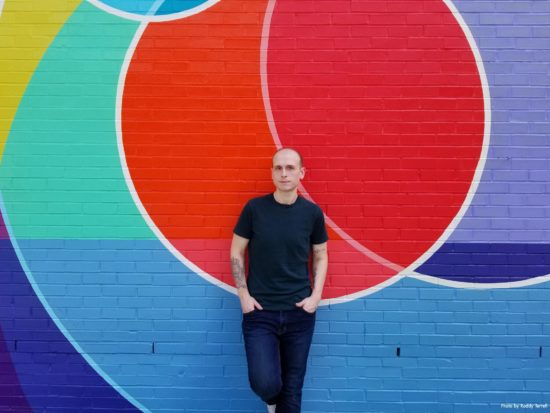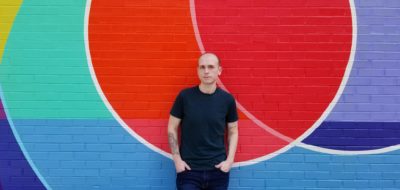Being a musician is not always about big stages and fan adoration. An artist must dive deep into their own mind to come up with song ideas sometimes reaching some dark and depression filled places. Our new friend Adam Drew, who goes by the musical alter ego The Religion for his synth-pop project, has been down these depths in his own brain.
With his new album Anhedonia set to be released today, September 28, The Religion took a moment to open up and share his struggles and thoughts on depression. Enjoy his guest post here:
What is depression like? To answer I’d have to respond with a question: what if you couldn’t trust your own mind? It’s a simple question, until you think about it. We like to think of our minds as transparent; we imagine ourselves as being in direct sensory contact with the world, our thoughts and reactions following naturally and rationally from the stimuli we receive. But that isn’t the case. Everything we see and hear, every sense perception, the entirety of the world we know is passed through the opaque structure of our minds where it is sliced-up, recombined, interpreted, and formed into the things we think we know by processes we are not conscious of and cannot control. The truth is, we see only what our minds let us see; we know only what our minds let us know. So, if you couldn’t trust your own mind everything would be called into question – it would be impossible to trust anything at all, even the most basic assumptions that keep us upright and moving forward.
What if you couldn’t tell if you were a good person, or a bad one? What if you couldn’t tell if the people in your life were better for knowing you, or worse? What if you couldn’t trust your own thoughts and feelings? Could you really tell the difference between a thought that is your own from one brought on by some hidden fear or desire? Are things really the way you think they are? Or is your mind playing tricks on you, showing you things that are true in ways that are not? Can you trust your ability to draw conclusions? Or are you being led unknowingly down dark paths by drives and fears you don’t even know you have? Could you prove it if you were? Could you prove it if you weren’t? How do you know if anything that you love and care about, anything you value, anything you think you believe in even matters? How can you really know anything at all? Questions such as these are the stuff of depression.
People think of depression as “being sad.” We’ve all been sad, had bad days, or felt down, and we map that experience onto those suffering from depression. That makes sense because in such times we say we are “depressed.” However, the everyday experience of being sad is only a shadow; depression is something altogether larger and more pernicious. Depression is like rot in the substructure of the mind; it doesn’t simply make one sad, it robs one of the ability to feel happiness, and in the worst cases it robs one of the ability to feel anything at all. It does this by eating away at the pillars that support our lives: volition, agency, self-control, value and trust, the assurance that you matter, the assurance that anything matters at all. Dark thoughts like uncountable swarms of termites eat their way through the mental structures that we rest the weight of our lives on, weakening our foundations, destabilizing us, and threatening to topple us over. In a way depression isn’t unlike poverty; when one is so deeply lacking in the basic needs of mental health one can’t even fathom attempting to attain higher order goals, such as fulfillment, self-actualization, or self-esteem – they are simply too far out of reach. In their inability to so much as imagine a better time the depressed cannot even dream; depression is emotional insomnia.
I have suffered from depression for as long as I can recall. I am fortunate, however, that my depression comes in fits – termed chronic depressive episodes. Rather than suffering constantly I go through periods of intense emotional and intellectual pain from which I am eventually released into the sun. Some suffer unendingly. I am doubly fortunate that I’ve learned to use music as a process for coping; through music I can perform a kind of emotional alchemy that allows me to make the darkest and ugliest thoughts into something beautiful. Most suffer without recourse to such a panacea. Music is my Roman Rite of Exorcism – it banishes demons. Most remain possessed by the devils in their heads. Finally, I count myself most fortunate because I am surrounded by a support network of people who carry me when I am too weak to walk. Most suffer singly – either with no one to ask for help or worse because they believe the devil’s favorite lie: “you are completely alone.” And maybe that’s the best answer to my original question: what is depression like? Depression is like being completely alone with nothing but your darkest thoughts as your only company, forever, and ever, and ever.
In closing I’d like to request something of you, dear reader: remember the depressed. If someone you know is suffering from depression know that they aren’t having a bad day, or a string of them – they’re under attack from an enemy that they cannot escape; an enemy that controls what they think and feel. They’re at war with their minds, and they do not have the upper hand. Do not rush to judgment, but rush to compassion. Provide support if they can ask – provide more if they cannot. Angels help mortals do battle with demons, and depression is the blackest of all hell’s devils. If ever the occasion calls and someone suffering from depression needs you, please dear reader be an angel.
Keep in touch with The Religion and feel free to share your story.






